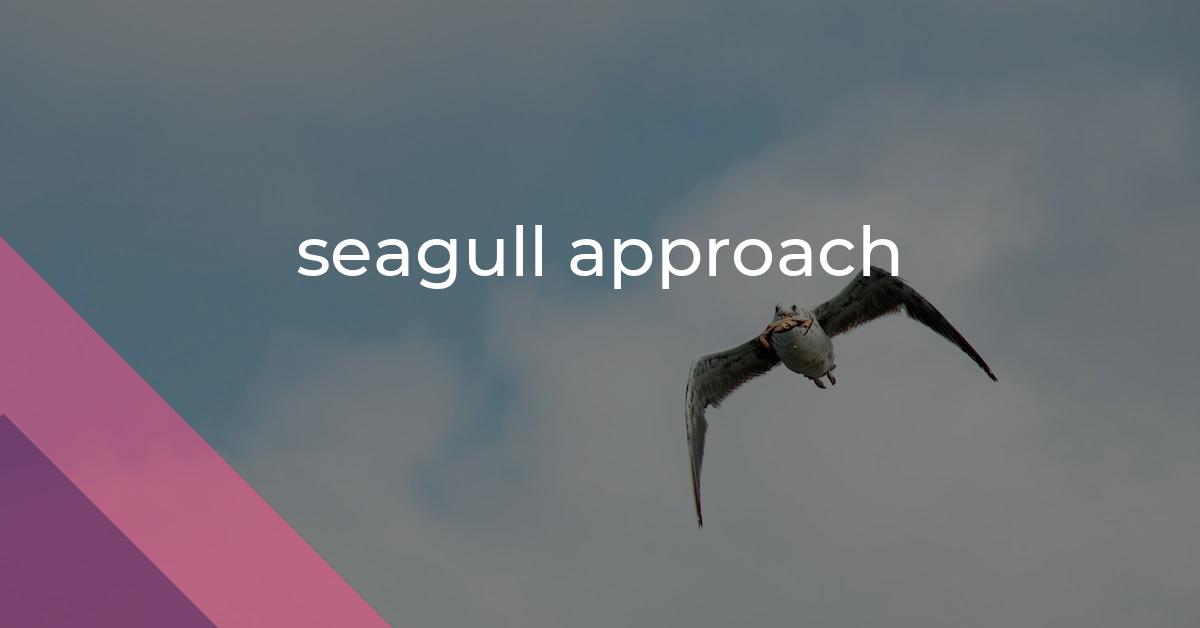seagull approach: Idiom Meaning and Origin
What does ‘seagull approach’ mean?
The idiom "seagull approach" refers to a management style where a person only gets involved in a project when it is near completion, offering critical feedback and suggestions without having been involved in the process from the beginning.

Idiom Explorer
The idiom "see which way the cat jumps" means to wait and see how a situation develops before making a decision or taking action.
The idiom "seat-of-the-pants" refers to doing something based on instinct, intuition, or improvisation, rather than careful planning or preparation. It implies a sense of spontaneity and reliance on one's own judgment in making decisions or taking actions.
The idiom "sea change" refers to a significant and transformative shift or alteration in a situation, often describing a sudden or unexpected change that has a profound impact.
The idiom "sail close to the wind" means to behave in a risky or dangerous way, pushing the limits of what is acceptable or legal.
The idiom "rough around the edges" means that someone or something may appear imperfect or unrefined, but still has potential or qualities that make them interesting or valuable.
The idiom "revolve around" means to be focused or centered on a particular thing or person, where everything else is influenced or determined by it.
The idiom *quick-and-dirty* refers to a hasty and temporary solution or approach that may not be perfect or thorough, but is done rapidly to meet immediate needs or deadlines.
The idiom "pick corners" means to engage in a process cautiously or carefully, considering every possible option or aspect before making a decision.
The idiom "out of the loop" means someone is uninformed or lacks knowledge about a specific situation or topic.
Deciphering Avian Management Tactics
The "seagull approach" refers to a management style characterized by brief and disruptive interactions. This idiom is often used in a negative context, highlighting the negative aspects of this management style.
The origins of the idiom are uncertain, but it is believed to have emerged in the business world, specifically in project management. While the exact first usage is unknown, the idiom gained popularity in the late 20th century and continues to be used today.
One characteristic of the seagull approach is the lack of consistent involvement or support from a manager. This style often involves managers who are absent for most of the project, only to swoop in at the last minute to give feedback or make sudden changes. This approach can create frustration and confusion among team members.
The seagull approach is disruptive to the workflow and progress of a project. Like a seagull causing chaos, managers employing this approach often disrupt the team's rhythm and cause delays, as well as damage morale and productivity.
The negative effects of the seagull approach are not limited to team dynamics. This management style can hinder communication and decision-making processes. When a manager only appears briefly and infrequently, important information may get lost or misinterpreted.
The seagull approach can prevent effective planning and coordination among team members. The sudden and unpredictable nature of this management style makes it difficult for teams to establish a solid plan and execute it smoothly.
While the seagull approach is generally seen as a negative management style, there may be situations where it could be beneficial. In certain creative or autonomous work environments, a hands-off approach from a manager may be welcomed. However, the key distinction in those cases is that the absence of the manager is intentional and agreed upon.
The idiom "seagull manager" is related to the seagull approach. A seagull manager is a type of manager who is absent for most of the project, only to swoop in at the last minute and make sudden changes. This type of manager often leaves a mess behind and fails to provide consistent support to their team.
The idiom "one step at a time" is also related to the seagull approach. While the seagull approach is characterized by sporadic and disruptive interactions, the idiom "one step at a time" emphasizes the importance of taking things slowly and methodically. This idiom encourages a more deliberate and thoughtful approach to management, rather than a chaotic and disruptive one.
Example usage
Examples of how the idiom "seagull approach" can be used in a sentence:
- Tom just swoops in, criticizes everyone, and then leaves - it's a classic seagull approach.
- Instead of offering constructive feedback, she tends to use the seagull approach, simply dropping off her opinions without any context or solutions.
- Don't be like the boss who never contributes to the team effort but always shows up at the end with the seagull approach, making a mess of things.
More "Management" idioms



